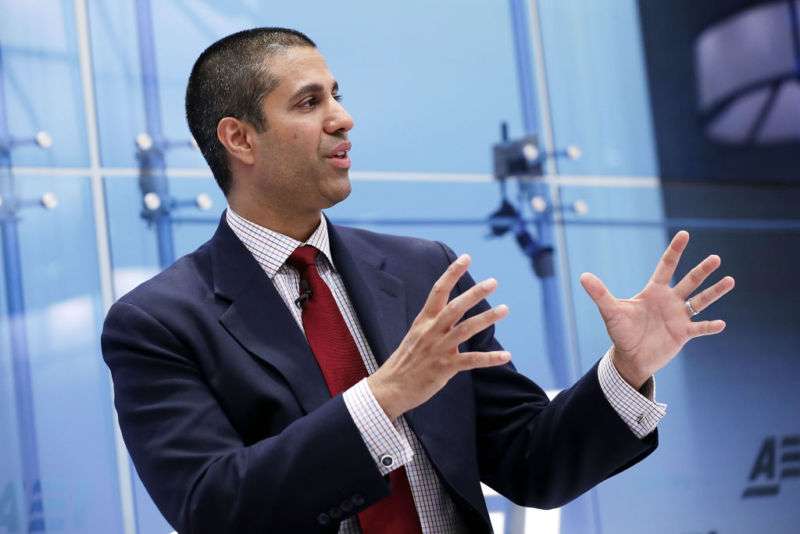
Ajit Pai orders phone companies to adopt new anti-robocall tech in 2019

The Federal Communications Commission will consider “regulatory intervention” if major phone companies fail to adopt a new anti-robocall technology this year.
FCC Chairman Ajit Pai has been pressuring phone companies to implement the “SHAKEN” and “STIR” robocall-blocking protocols, which perform Caller ID authentication. Most major providers have committed to doing so, but Pai issued a warning to laggards yesterday.
“I applaud those companies that have committed to deploy the SHAKEN/STIR framework in 2019,” Pai said in his statement yesterday. “This goal should be achievable for every major wireless provider, interconnected VoIP operator, and telephone company—and I expect those lagging behind to make every effort to catch up. If it appears major carriers won’t meet the deadline to get this done this year, the FCC will have to consider regulatory intervention.”
Pai did not say what kind of regulatory intervention he will consider.
Together, SHAKEN and STIR prevent spoofing of Caller ID. Carriers already offer robocall-blocking services, but SHAKEN and STIR are expected to provide a big improvement.
“STIR and SHAKEN use digital certificates, based on common public key cryptography techniques, to ensure the calling number of a telephone call is secure,” telecom software provider TransNexus explains. “In simple terms, each telephone service provider obtains their digital certificate from a certificate authority who is trusted by other telephone service providers. The certificate technology enables the called party to verify that the calling number is accurate and has not been spoofed.”
SHAKEN and STIR will work best when it’s adopted by all major phone providers.
In November, Pai criticized seven phone providers that he said apparently do “not yet have concrete plans to implement a robust call authentication framework.” The carriers that earned Pai’s ire were CenturyLink, Charter, Frontier, Sprint, TDS Telecom, US Cellular, and Vonage.
At the time, Pai praised seven other carriers that had already committed to implementing SHAKEN/STIR. Those carriers were AT&T, Verizon, T-Mobile, Comcast, Bandwidth.com, Cox, and Google.
Pai sent letters to all 14 of the carriers asking for more information on their plans. Yesterday, he published responses from all of them.
In the letters, five of the seven carriers that Pai previously criticized committed to adopting SHAKEN/STIR this year. The remaining holdouts were Sprint and TDS Telecom.
Sprint, TDS plan tests this year
Sprint’s letter to Pai said that it “plans to conduct testing of SHAKEN signing and verification with large VoIP peering partners in the 2nd half of 2019 with the implementation of VoLTE [Voice over LTE] on Sprint’s network.” Sprint said it also “anticipates lab and field integration testing in the 2nd and 3rd quarters of 2019.” But Sprint’s letter didn’t say when the carrier will move from testing to making the technology available to all customers.
However, Sprint’s letter was sent in November, and the carrier today seemed to come closer to promising availability in 2019. When contacted by Ars, Sprint today said, “We are fully committed to deploying SHAKEN/STIR, and plan to implement and test cross-carrier interoperation this year.” Sprint did not give us a yes-or-no answer to the question of whether it’s fully deploying SHAKEN/STIR this year.
TDS’ letter said it is “commit[ted] to testing a SHAKEN/STIR solution in our IP network in 2019.” But TDS didn’t commit to an implementation date. “It is our hope and expectation that this testing will enable us to determine the circumstances and specific timetable under which SHAKEN/STIR can be implemented as a robust call authentication solution in our network,” the letter said.
When contacted by Ars today, TDS said only that it “remains committed to the timeframe and process as explained” in its letter.
Other carriers that were previously criticized by Pai offered more specific promises. CenturyLink, for example, said its goal is “initial implementation beginning as early as mid-2019,” and that it “expect[s] to be able to sign calls originating on the IP portions of our voice network by the end of 2019.” Charter said it “expect[s] to begin signing calls on our network in 2019, provided that adequate third-party software solutions are available and scalable.”
Sprint and TDS cited roadblocks to adopting SHAKEN/STIR. “Sprint is in the midst of transitioning from CDMA voice to VoLTE,” Sprint told Pai in its letter. “At its core, SHAKEN/STIR is a VoIP technology. There is no vendor support for CDMA voice application of SHAKEN/STIR and improvising a temporary solution would divert time and resources from completing the transition to VoLTE that will fully support SHAKEN/STIR.”
TDS said that its network is “a hybrid of IP- and TDM-based solutions,” and that SHAKEN and STIR can’t be implemented on the older TDM portion used primarily in rural areas. However, that doesn’t explain why TDS isn’t committing to a 2019 deployment date in its IP network. T-Mobile last month said it has already deployed SHAKEN and STIR, although it’s initially only available on the Samsung Galaxy Note9.
Pai: No excuses
Pai was not convinced by carriers’ excuses.
“While some carriers committed to roll out these services in the coming months, others hedged, citing concerns that other carriers appear to have already addressed,” the FCC announcement yesterday said. “Chairman Pai believes that wireless providers, interconnected VoIP providers, and telephone companies should make real caller ID authentication (the SHAKEN/STIR framework) a priority and believes that major carriers can meet his 2019 goal.”
Separately, the FCC today proposed rules that would prohibit Caller ID spoofing on text messages and international calls. The prohibitions already applied to calls originating from within the United States.
The FCC today also released a report on illegal robocalls and progress combating them.
Disclosure: The Advance/Newhouse Partnership, which owns 13 percent of Charter, is part of Advance Publications. Advance Publications owns Condé Nast, which owns Ars Technica.




